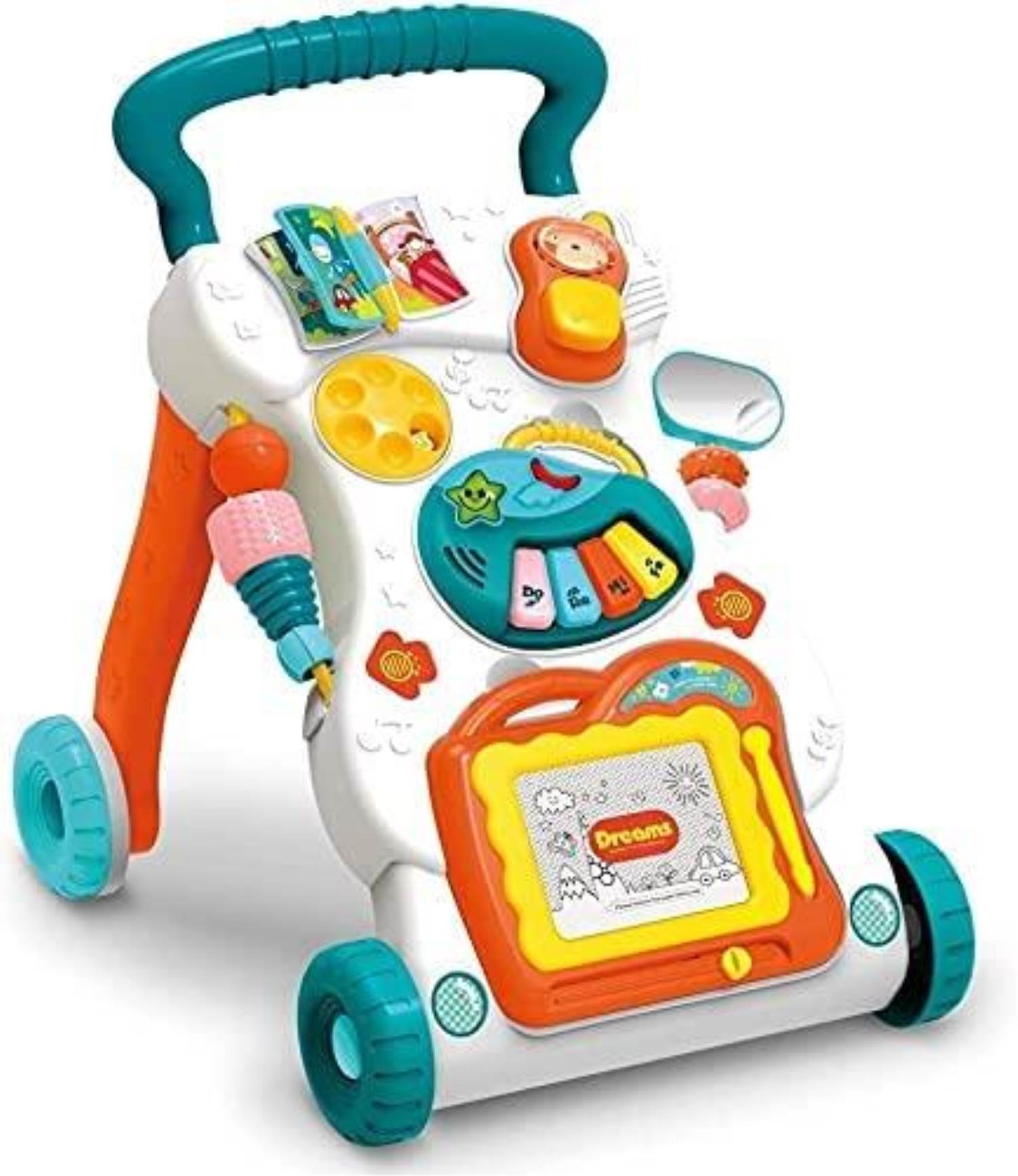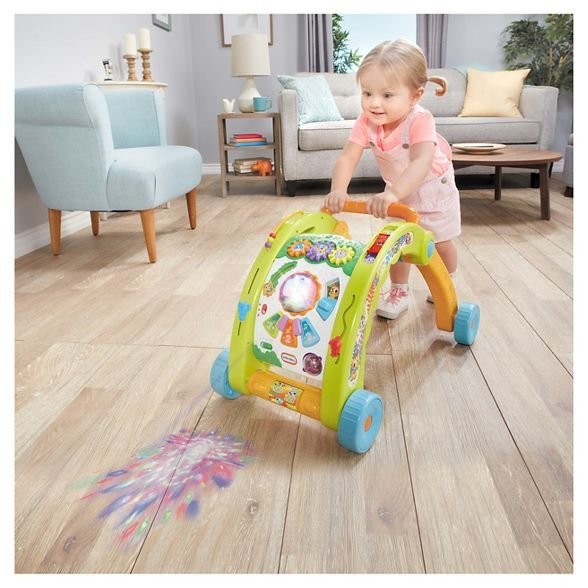A baby stand-up walker helps babies practice standing and walking, promoting motor skills development. It is a tool that aids in your baby’s physical development and exploration.
As your baby grows and becomes more active, supporting them with a stand-up walker can assist in strengthening their leg muscles and coordination. However, it is essential to note that safety is paramount when using baby walkers, as they can also pose risks if not supervised properly.
Understanding the benefits and potential risks associated with baby stand-up walkers can help you make an informed decision on whether it is suitable for your little one’s developmental stage.

Credit: www.smilebabyonline.com
Top Baby Stand Up Walker Options
Baby stand-up walkers are an essential aid for little ones to take their first steps. Below are the top recommendations for baby stand-up walkers that provide both support and entertainment.
Vtech Sit-to-stand Learning Walker
The VTech Sit-To-Stand Learning Walker, available in a variety of colors, is a versatile option that offers a combination of support for standing and interactive learning activities.
Price Range:
- Blue: $58.00 at Walmart
- Orange: $39.99 at Amazon.com
Fisher-price Laugh & Learn Smart Stages Walker
The Fisher-price Laugh & Learn Smart Stages Walker with its engaging smart stages technology encourages little ones to take their first steps while providing them with educational content.
Price Range:
- Blue: $24.00 at Walmart
- Available at $29.99 on Amazon.com
Baby Einstein Around We Grow
The Baby Einstein Around We Grow walker boasts a 3-in-1 design that allows babies to explore, walk, and play. It is designed to grow with the child’s needs and offers a variety of interactive activities.
Joovy Spoon B Baby Walker
The Joovy Spoon B Baby Walker is a versatile and adjustable walker designed to provide support and help babies take their first steps with ease and comfort.

Credit: www.amazon.com
Choosing The Best Walker For Your Baby
Baby stand-up walkers can be a fun and beneficial tool in helping your little one take their first steps. When it comes time to choose the best walker for your baby, there are several factors to consider to ensure safety and enjoyment.
Safety Features To Look For
Safety should always be the top priority when selecting a baby walker. Look for features like sturdy construction, non-slip grips, and wide bases to prevent tipping over.
Entertainment And Educational Value
Engagement and education are essential for your baby’s development. Choose a walker that offers interactive toys, sound effects, and colorful designs to keep your baby entertained while promoting their cognitive skills.
Remember, the best baby walker is one that provides a safe and stimulating environment for your little one to explore and learn as they take their first steps towards independence.
Are Baby Walkers Recommended?
Stand up walkers for babies can be a safety hazard and are not recommended by health and safety experts. They can lead to injuries and are discouraged for use.
Expert Opinions On Walker Usage
Baby walkers have been a topic of contentious debate among experts in child development and safety. While some experts believe that baby walkers can enhance a baby’s motor development and promote independence, others express concerns about their safety and potential negative impact on a baby’s development.
According to the American Academy of Pediatrics (AAP), many experts discourage the use of baby walkers. They argue that walkers can delay certain developmental milestones, such as crawling and walking, and may even lead to injuries. The AAP recommends alternative methods, such as interactive play and supervised tummy time, for promoting a baby’s physical development.
Similarly, the Canadian Pediatric Society (CPS) discourages the use of walkers due to safety concerns. They highlight the increased risk of falls and accidents associated with walkers, as babies can move quickly and reach hazardous objects or areas before caregivers can react.
Risks And Dangers Associated With Baby Walkers
Beyond the concerns raised by expert organizations, there are specific risks and dangers associated with the use of baby walkers.
1. Increased risk of falls: Baby walkers allow infants to move faster than their walking ability, which increases the risk of falling down stairs, tipping over, or colliding with objects in their path.
2. Delay in motor development: Some studies suggest that reliance on baby walkers can delay the development of important motor skills, such as crawling and walking, as babies spend less time engaging in these activities independently.
3. Accidents and injuries: Baby walkers can lead to accidents and injuries, including burns from reaching hot surfaces, pinching fingers in moving parts, or collisions with furniture and other objects.
4. Developmental consequences: Continuous use of baby walkers can potentially hinder a baby’s natural development, as they may rely on the assistance provided by the walker instead of building their strength and coordination necessary for independent mobility.
Given these risks and the professional recommendations against the use of baby walkers, it is essential for parents and caregivers to consider alternative methods and toys that promote a baby’s safe and healthy development.

Credit: www.amazon.com
Alternatives To Stand Up Walkers
Baby stand up walkers are a popular choice for helping little ones take their first steps. However, there are alternative options for supporting your baby’s development. Let’s explore some exciting alternatives that offer similar benefits.
Activity Centers For Babies
Activity centers are a fantastic alternative to stand up walkers. These versatile play stations provide a safe environment for babies to explore and play. They often feature interactive toys, spinning seats, and activities that encourage movement and cognitive development. Activity centers promote sensory exploration and help babies develop motor skills in a stationary but stimulating environment.
Developmental Toys For Motor Skills
Offering a wide range of developmental toys can be an excellent substitute for stand up walkers. Toys such as stacking rings, shape sorters, and push-along toys can aid in enhancing a baby’s motor skills. These toys encourage reaching, grasping, and pushing, fostering the development of coordination and strength. Additionally, age-appropriate puzzles and building blocks can promote problem-solving abilities and fine motor skill development in young children.
When considering alternatives to stand up walkers, it’s crucial to prioritize your baby’s safety and developmental needs. By choosing engaging activities and toys that support their growth, you can provide a stimulating and nurturing environment for your little one.
Pros And Cons Of Baby Walkers
Stand up walkers for babies have their pros and cons. While they can encourage early walking and provide entertainment, they can also pose safety hazards and increase the risk of injuries. Health and safety experts advise against using baby walkers.
Benefits Of Baby Walkers
Several advantages come with using baby walkers:
- Can help babies develop leg muscles
- Provide entertainment and stimulation for babies
- Allows babies to explore their surroundings with mobility
- May give parents a break by keeping babies occupied
- Some models offer additional features like music and toys
Drawbacks And Concerns
However, baby walkers also come with drawbacks and potential concerns:
- Can be a safety hazard due to the risk of falls and accidents
- May delay or affect the development of natural walking skills
- Difficult to use on uneven surfaces or stairs
- Constant use may lead to over-dependence on the walker
- Requires constant supervision to prevent accidents
Parenting Faqs On Baby Walkers
Introducing your little one to a walker is an exciting milestone for both parents and babies. However, it’s crucial to determine the appropriate age to do so. Experts recommend introducing a baby stand up walker when the child is able to hold their head up steadily and sit independently. This usually happens around 6-8 months. It’s important to ensure that the walker is adjusted to the correct height to provide proper support and avoid any strain on the baby’s legs.
While baby walkers can aid in a child’s development, there are certain safety concerns that parents need to address. The major concern is the risk of accidents due to the increased mobility of the baby. It’s important to always supervise the child while using the walker and ensure that the activity area is free from any potential hazards such as stairs, sharp objects, or electrical outlets. Additionally, it’s essential to choose a walker with sturdy and non-skid wheels to prevent tip-overs and ensure the safety of the baby.
Frequently Asked Questions
Are Stand Up Walkers Good For Babies?
Stand up walkers are not recommended for babies as they can cause injuries. Health experts discourage their use due to safety concerns.
What Age Would You Get Your Baby A Stand Walker?
It is generally recommended to introduce a stand walker when your baby is around 8-10 months old.
Why Are Baby Walkers Not Recommended Anymore?
Baby walkers can cause serious injuries in young children, and are a leading cause of injuries. Health and safety experts strongly discourage their use. A new study published by the American Academy of Pediatrics recommends that they not be sold or used.
What Is The Best Age To Start Baby Walker?
The best age to start a baby walker is not recommended anymore. Walkers are a safety hazard and a leading cause of injuries in babies. Health and safety experts strongly discourage their use. Additionally, a study by the American Academy of Pediatrics shows that infant walkers can cause serious injuries, so it’s best to avoid them.
Conclusion
Discover the magic of learning with a wooden baby walker. Enhance motor skills and creativity while keeping your baby safe and entertained. Say goodbye to traditional walkers and opt for a safer, more beneficial option. Invest in your baby’s development with a smart choice for early learning.




